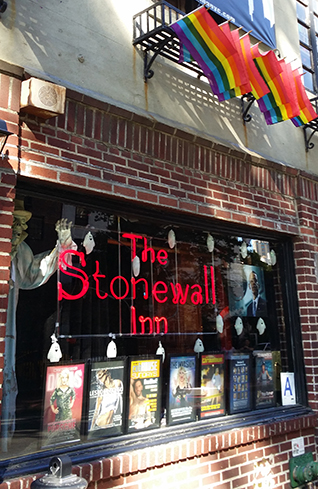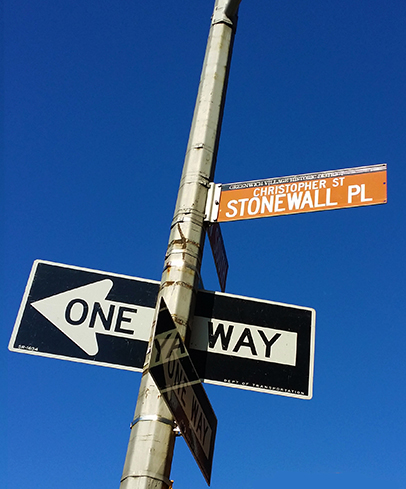
The story goes like this: the people were screaming, begging the cops to let them go, pleading that an arrest would devastate their lives. People were trying to escape the paddy wagon, but they were pushed and packed in, while the doors were being closed. Then a voice – that of Stormé DeLarverie, a self-identified butch lesbian and African-American from New Orleans – cut through the chaos. “Why don’t you guys do something!”
They did.
At 1:20 a.m. on Saturday, June 28, 1969, one community had enough of its oppression, and a riot borne out of resistance began – but perhaps riot is not the right word. DeLarverie would later insist that what happened at the Stonewall Tavern that night “was a rebellion, it was an uprising, it was a civil rights disobedience – it wasn’t no damn riot.”
What followed was the birth of a movement that has expanded the rights of many individuals around the world, not only those of us in the queer community, but for others as well. Because of Stonewall, we have seen a social expansion of our understanding of sexual orientations and non-binary categories of sexual expression, and an openness to relationships that look different from the traditional man-woman-monogamous-married structure that all were once assumed to follow.
Every July 4, the Mattachine Society picketed in front of Independence Hall in Philadelphia to protest the expulsion of all homosexuals from employment with the U.S. government during the McCarthy era. These “Annual Reminders” were led by Frank Kameny, along with Barbara Gittings, Kay Lahusen, Craig Rodwell and Randy Wicker. After Stonewall, these protests included a new form of civil disobedience: public displays of affection between same-sex couples. Some of them held hands.
Couples held hands. It was scandalous. Even Kameny objected.
Some 500 people continued protests during a “Gay Power” rally later that month in New York, and planning began for the Christopher Street Liberation Day event for the following year began. Within a couple of years, every major city in the US and Canada, as well as many across Western Europe and Australia, had groups organizing for and in celebration of queer rights. As our colleague Clio Ajana wrote at the beginning of Pride Month, “We celebrate through festivals, parades, and gatherings filled with rainbow flags where all parts of the LGBTQ community is out front, loud, and proud.”

It would be another decade before we had a flag. Our columnist Storm Faerywolf wrote about its meaning a few days ago. And during that time, many leaders exited the closet to bring in new breakthroughs for LGBTQ people.
Forty years later, President Barack Obama declared June of 2009 LGBTQ Pride Month, citing the riots as a reason to “commit to achieving equal justice under law for LGBT Americans.”
That said, there were setbacks as well.
Miami became a national flashpoint when Anita Bryant organized the “Save our Children” campaign after the Dade County Commission outlawed discrimination based on sexual orientation on January 18, 1977 in employment, housing, and public services. Ultimately it went to voters and they repealed the ordinance.
AIDS butchered many in my generation. Partners were not allowed to visit each other on their death beds. Medical institutions were overwhelmed. Politicians were silent; even the American president ignored the disease while people died.
AIDS also created a new resistance with ACT-UP. It brought renewed force to the battle for equality. It had become clear that “Silence = Death”.
It would be almost 30 years before the institution of “don’t ask, don’t tell” and the ending of harassment against LGBTQ federal workers. It would be more than 40 years before marriage equality in the US.
Many rightly focus on Stonewall as the event that began social changes that resulted in more LGBTQ acceptance. It is correct – especially in our Pagan understanding – to acknowledge the work of our ancestors and the accomplishments they achieved that bring us to the present. They tore down laws that made homosexuality illegal in many jurisdictions. (Such laws once were present in every U.S. state except for Illinois). They ended the hunts for LGBT people in government jobs. They eliminated many elements of social discrimination against LGBT people and they even de-pathologized us in medicine, psychiatry, psychology, nursing and social work.
That work remains ongoing to this day. Stonewall may have begun the end of many barriers, but they are far from ended. Here are a few:
-
-
-
-
- There is still no federal protection in housing.
- There is no federal protection against employment discrimination.
- There is no viable LGBTQ infrastructure regarding aging.
- There is an actual ban in the USA against transgender persons serving in the armed forces.
- Health-care providers can deny service on the basis of religious freedom (45 CFR Part 88).
- LGBTQ adults cannot universally adopt or foster children.
- LGBTQ kids are bullied in their schools.
- LGB and especially T kids are homeless in record numbers.
- Hate crimes against sexual and gender minorities are up.
- The trans community remains vulnerable to violence.
-
-
-
And frankly, the barrage of micro-aggressions and “unintended” sleights against sexual minorities has never been so prevalent; just look at memes that use homosexuality as a means of shaming politicians.

Society makes the claim of acceptance while keeping us as “the other.” We have not yet become simply “a couple” – we remain a “gay couple”. We are not “the soldiers,” we’re the “trans soldiers.” The other lies in the adjectives, which prevent full acceptance and the privileges that come with it.
Hours ago, Twitter reports came in that a black trans woman spoke up during a drag show at Stonewall to bring attention to the critical challenges. She was met with resistance by people celebrating Pride. She succeeded. She raised that black trans women were dying and that Pride had become parties and corporate opportunities. She read the names of black trans women who have died.
Reports say the speech took a huge toll on her. She is also a hero. She reminded everyone to not forget our history.
It’s also a reminder that we can easily blind ourselves.
Today, we are on Stonewall at 50 years and a day. What I am reminded of is that Stonewall is not just an event: it is a process, one that our community of Pagans, Heathens, and polytheists must remind ourselves of as well.
Just as we maintain our altars and our relationships with deities, nature, and ancestors, our rights must equally be cultivated and maintained. The patriarchy will miss no opportunity to reassert itself and invalidate every claim of equality we make.
The process of Stonewall, at 50 years and day, reminds me that we haven’t, and we mustn’t, back down. The same and powerful kyriarchy that tries to overpower us as LGBTQ individuals is the same one at work against religious liberties. Every right is the product of resistance, and every gain must be defended.
The Wild Hunt is not responsible for links to external content.
To join a conversation on this post:
Visit our The Wild Hunt subreddit! Point your favorite browser to https://www.reddit.com/r/The_Wild_Hunt_News/, then click “JOIN”. Make sure to click the bell, too, to be notified of new articles posted to our subreddit.
